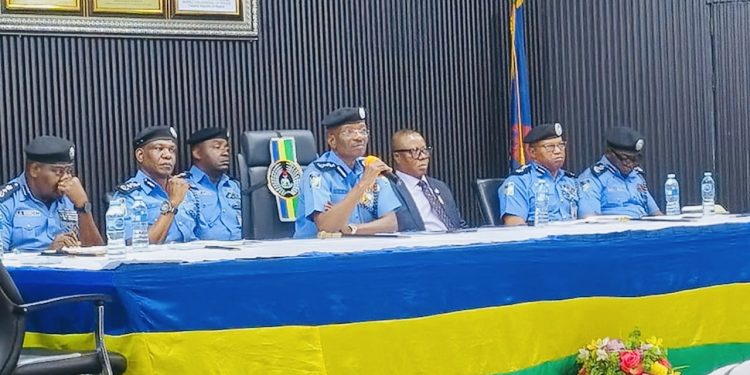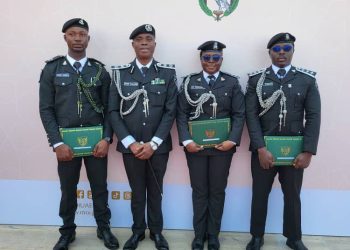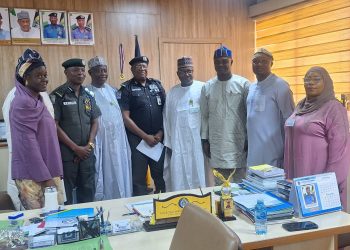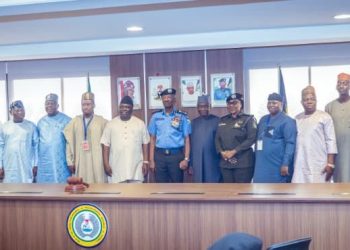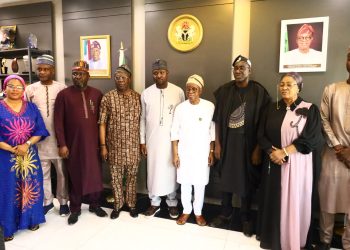…Over 11,000 Special Protection Unit personnel recalled for frontline policing duties
By Nkechi Eze
The Inspector-General of Police, IGP Olukayode Egbetokun, has directed the strict enforcement of President Bola Ahmed Tinubu’s order for the withdrawal of police personnel attached to Very Important Persons, confirming that over 11,000 officers have so far been pulled out from VIP protection assignments and reassigned to core policing responsibilities across the country.
The IGP made this disclosure in Abuja on Thursday during a strategic conference with senior police officers held at the Goodluck Ebele Jonathan Peacekeeping Hall, where he delivered a strongly worded address that set the tone for a complete recalibration of national policing operations. His remarks came against the backdrop of recent attacks across Kwara, Kebbi, and Niger States, which he described as painful breaches of the peace Nigeria has worked tirelessly to sustain.
The IGP condemned the abduction of thirty-eight worshippers in Eruku, Kwara State; the kidnapping of twenty-five school girls in Maga Town, Kebbi State; and the violent assault on St Mary’s Catholic School in Papiri, Niger State. According to him, these incidents, though swiftly responded to and professionally managed, created “a momentary impression in some quarters that we are not working,” but he stressed that the Nigeria Police Force has not been complacent.
“We might not have been doing enough but definitely not that we are not doing anything,” he said firmly, adding that the Force will not celebrate or rest until every abducted child in Niger State is safely reunited with their family. “Peace maintained in one location but violated in another is not peace.”
He reaffirmed that the successful rescue of victims in both Kebbi and Kwara demonstrated the operational strength of coordinated response, joint action and inter-agency collaboration. According to him, these positive outcomes underline the importance of unified security architecture: “Crime is defeated fastest when response is unified, intelligence-driven and operationally coordinated.”
The IGP announced that such joint-response models will now be institutionalised as the national standard, noting that security agencies are already synchronising operations and intelligence-sharing at levels never witnessed before. He emphasised that fragmented responses only create opportunities for criminals, whereas united action eliminates them.
While acknowledging improvements, he emphasised that Nigerians expect more. Public confidence in policing, he said, depends not on intention but on impact. “These attacks are unacceptable,” he declared, stressing that policing must move from reactive postures to proactive threats disruption.
To confront emerging criminal strategies, the IGP rolled out a comprehensive set of enhanced policing frameworks aimed at deepening territorial dominance, strengthening protection of vulnerable communities, and reinforcing national safety.
He directed all Commissioners of Police to operationalise a fortified native intelligence network that draws lawful, actionable information from markets, student communities, religious institutions, transport unions, farming settlements and other grassroots structures. He emphasised that intelligence assets must be properly trained, protected and insulated from political manipulation.
He also ordered renewed empowerment of community policing structures, emphasising that community policing is foundational to national security. He instructed commands to build Joint Community Safety Forums, Village-Level Rapid Information Channels and Community Threat Profiling Systems to ensure early detection of risks before criminals gain ground.
The IGP further directed commands to massively increase police visibility through structured and intelligence-guided foot patrols, convoy-style highway patrols, mobile checkpoints that comply with lawful procedures, and vehicular dragnet operations designed to disrupt criminal transit and supply chains. “Citizens must see us more often than they currently see criminals,” he stressed.
On inter-agency synergy, he emphasised that “security rivalry helps crime, security synergy breaks it.” He ordered the expansion of shared intelligence briefings, joint tactical operations, joint route-domination patrols with the Armed Forces, and strengthened operational links with the NSCDC and other security actors, especially in frontier states such as Kebbi, Niger and Sokoto.
Speaking on the President’s directive on police withdrawal from VIP protection duties, the IGP stated that the policy is not sentimental but strategic, aimed at restoring policing manpower to critical national security needs. “This withdrawal will enable the Force to expand deployment into areas where policing input has the most meaningful public safety outcomes,” he said.
He noted that this includes rural defence, township fortification, expanded patrol visibility, investigative response enhancement and tactical containment of violent threats. The IGP warned against misinformation and exploitation of the process by malicious actors, disclosing that implementation modalities will be issued in phases to prevent opportunistic manipulation or impersonation. He confirmed that 566 officers have already been withdrawn from SPU duties and redeployed to active policing roles.
Reiterating that the policy represents “a reclamation of responsibility, not a retreat,” he assured the nation that the police will reinforce policing where it truly matters. “Nigeria cannot afford policing pauses, and we will not give it one,” he declared.
The IGP highlighted significant operational achievements recorded since the last strategic meeting. A total of 8,202 suspects were arrested for various crimes, including 451 armed robbery suspects, 356 kidnapping suspects, 534 murder suspects, 173 persons arrested for unlawful possession of firearms, 312 rape suspects, and 382 suspected cultists. The Force also recovered 249 assorted firearms, 2,989 rounds of ammunition, 238 vehicles, and rescued 232 kidnap victims.
With the festive season approaching, the IGP warned that criminals may attempt to exploit the nation’s highest annual travel period. He has therefore directed all State Commands to activate Festive Deployment and Visibility Plans that include expanded highway patrols, reinforced foot patrols in motor parks, intelligence-led rural patrols, and extensive inter-agency route protection coverage. Commands have also been instructed to integrate Artificial Intelligence tools, including drones and other technical assets, into their policing strategies.
He expressed gratitude to President Bola Ahmed Tinubu for the administration’s renewed support for policing operations, including recruitment, equipment, mobility capacity, training institutions, and welfare improvements. He assured the President and Nigerians that the Force will justify this confidence through results, not promises.
He concluded by reaffirming the resolve of the Nigeria Police Force to remain the foremost guardian of internal security. “Nigeria depends on us, and we will not fail her,” he declared.


